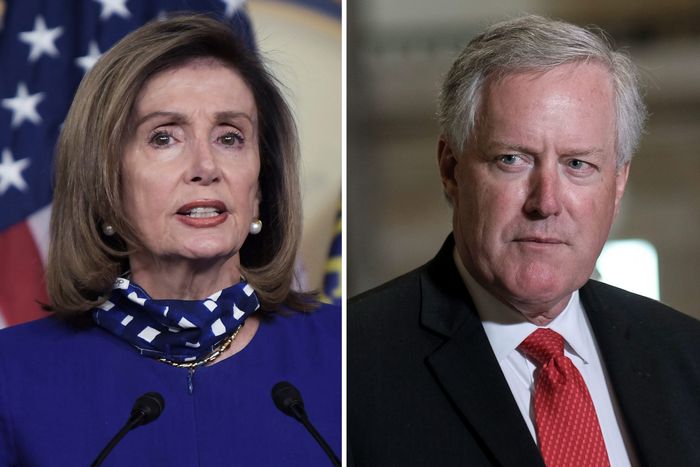
There are many factors contributing to the virtual breakdown of White House–congressional negotiations on the first major coronavirus relief and stimulus measures since March, including a bloc of Senate Republicans that doesn’t want to do anything at all and big, substantive differences on issues like assistance to state and local governments. But Democratic congressman Gerry Connolly of Virginia may have put his finger on precisely why these talks have slowed down recently in an interview with the Hill:
“Closing deals is not Mark Meadows’s strong suit. His whole track record is: blow it up,” said Rep. Gerry Connolly (D-Va.), who served with Meadows on the Oversight Committee and has teamed up with him on good-government legislation. “There is this other side of Mark, but his track record here on the Freedom Caucus, on the Boehner vacating the seat effort, on government shutdowns are not his strong suits.”
“If you ask yourself what’s the difference between April and May, when we did reach big, broad bipartisan consensus, and today,” he added, “the variable is Mark Meadows.”
Without question, stimulus negotiations have slowed down and become more acrimonious with the emergence of White House chief of staff and former House Freedom Caucus chairman Mark Meadows joining Treasury Secretary Steven Mnuchin as chief co-negotiator for the administration (which, in turn, is representing congressional Republicans). Perhaps it’s a coincidence that Meadows’s arrival coincides with this stagnation, but most people familiar with his history don’t think so, the Hill reports:
Until the Trump era, Meadows, 61, had always been a political outsider excluded from the room where deals were being hashed out. The Tea Party insurgent, known for his southern charm and coziness with reporters, first won election to his far western North Carolina House seat in 2012, but he exerted his power — and made a name for himself on the Hill — by attacking his own party leaders, derailing big bipartisan negotiations and finding his way regularly into print media and broadcast news.
The odds are reasonably good that the addition of Meadows to the negotiating mix reflected right-wing mistrust of Mnuchin at both ends of Pennsylvania Avenue and the need to keep congressional conservatives from open revolt. Just as important, the erratic POTUS may have had second thoughts about Mnuchin’s reasonableness, as the New York Times reports today:
One spring day, not long after President Trump signed the largest economic stimulus package in American history in March, a group of his top aides and cabinet officers gathered in the Oval Office …
“I never should have signed it,” Mr. Trump bellowed, according to someone who was there. He pointed at his Treasury secretary. “You’re to blame.”
The same Times piece describes Meadows as Mnuchin’s “chaperone” in the more recent talks.
If conservatives don’t trust Mnuchin, you can imagine how congressional Democrats and their no-nonsense leader, Nancy Pelosi, feel about Meadows. Indeed, as NBC News reported last week, Pelosi isn’t even taking the White House chief of staff seriously as a negotiator:
Pelosi, who has repeatedly called Meadows “What’s his name,” said on Thursday that he is “not even the lead negotiator” for the White House, saying that is Mnuchin’s role in the talks.
For his part, Meadows has taken to publicly blasting Pelosi, expressing anger over the weekend when the Speaker didn’t respond positively to a reported $300 million bump in the maximum amount (previously an even trillion) Republicans would consider for the next stimulus bill, per Politico:
White House chief of staff Mark Meadows on Sunday blamed the impasse on a new coronavirus relief bill on House Speaker Nancy Pelosi, saying the Trump administration‘s offer of $1.3 trillion deserves the Democrats’ serious attention.
“Listen, we’re not going to negotiate here because the speaker’s been very clear,” Meadows told Chuck Todd on NBC’s “Meet the Press,” characterizing Pelosi as inflexible. ‘When she said $2.2 trillion, she said, ‘Don’t do anything at all.’”
Meadows did not mention that Pelosi’s latest offer of $2.2 trillion was $200 billion lower than her previous top-line minimum, itself based on a halfway point between the Democratic HEROES Act and the Republican HEALS Act. Perhaps not coincidentally, $2.2 trillion was the price tag on the CARES Act that Trump signed in March.
Subsequently Meadows has muddied the waters even more by touting a much smaller Senate Republican proposal that’s been kicking around for weeks – a $500 billion so-called “skinny stimulus” – as a sign of “real progress,” even though all the “progress” involves arguments within a divided Republican Party and the “skinny stimulus” moves far away from anything Democrats would accept.
In theory, there is additional common ground between the two parties on stimulus measures, notably the need for (not to mention the vast political value of) a second direct stimulus check, which was included in both HEROES and HEALS. Getting from here to there may require the pressure of a fiscal-year-end deal to avoid a government shutdown, but the one player in the mix who has never much minded shutting down the government is Mark Meadows. He could be the fly in the ointment.
This post was updated to include Meadows’ remarks on “skinny stimulus.”






























